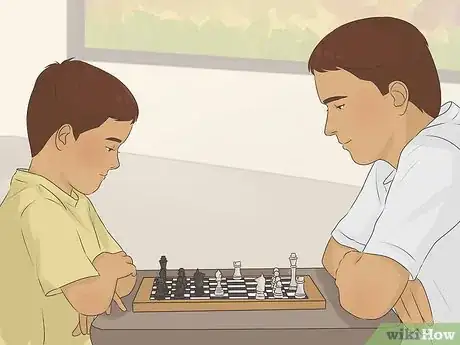This article was co-authored by Kathy Slattengren, M.Ed.. Kathy Slattengren is a Parent Educator and Coach and the Founder of Priceless Parenting. With over two decades of experience, Kathy specializes in helping parents build strong, loving relationships with their children. She has helped thousands of parents around the world through Priceless Parenting's online classes, presentations, coaching, and books. Kathy holds a Bachelor's degree in Computer Science and Psychology from The University of Minnesota and a Masters degree in Education and Instructional Design from The University of Washington. Kathy is a member of the National Parenting Education Network, the US Alliance to End the Hitting of Children, the International Society for Technology in Education, and a founding member of Parent Learning Link. Priceless Parenting has been featured on ABC News, Komo News, King 5 News, National PTA, Parent Map, and Inspire Me Today.
This article has been viewed 23,296 times.
As a parent, you’re responsible for your child’s health and happiness, which can sometimes be pretty stressful and overwhelming. Luckily, you can raise your child to be a happy person by caring for them, paying attention to them, and talking to them about their emotions. As your children grow up, you can guide them through life’s challenges and encourage them to focus on happiness and fulfillment.
Steps
Nurturing Social and Emotional Happiness
-
1Help your child understand and identify their emotions. Children rely on their parents to help them talk about their emotions. If your child is feeling happy, sad, upset, or excited, talk with them about it and tell them about your experience with that emotion. This helps to instill emotional intelligence in children, and helps them become more in tune with their feelings as they grow up.[1]
- For example, if your child masters a new game, like throwing and catching a ball, and you see them smiling and laughing, you can say something like “You’re so happy! I love seeing you smile!”
- It’s also important to identify less positive emotions, like frustration. For example, if your older child is crying because you told them they weren’t allowed to go out with friends, you can say “I know you’re upset. Are you annoyed because I told you no?”
- Teach your children emotions by using visual cues that they can access easily. Use flashcards or an emotion poster your child can refer to when they have trouble telling you how they feel.
-
2Encourage them to spend time with their friends. Social connections are extremely important for children, so be sure to give them enough time with their friends. Organize play dates for younger children, and allow older kids to spend time with their friends from school and extracurricular activities. Try to help them devote at least 2 hours each week to spending time with friends.[2]
- Coordinate with other parents of younger children to make weekly or monthly playdates with a variety of different friends.
- For older children, offer to host their friends after school for a study session or even a sleepover so you can see how their friendships are going.
- If your child is having problems making and keeping friends, talk to them about what’s going on. If you suspect that they’re being bullied, contact their teacher to discuss the issue and find a resolution.
- Encourage your child to connect with others at extracurricular activities and make an effort to take your child to social gatherings when they’re invited. Talk to your child to have them invite their friends to their own celebrations.
Advertisement -
3Consider limiting “screen time” to 2 hours per day. Recent studies have shown that tweens and teens who spend more time in front of screens playing games, texting, or using social media reported feeling less happy. While social connection online is important, remind your children to have other forms of social connections that are based on face-to-face interactions.[3]
- However, it’s important not to be too restrictive on their social media activity. Find a spot that you’re both comfortable with, and trust your child to stay involved in real life. If problems arise, don’t be afraid to step in and limit their screen time further.
- Help your kids steer clear of social media sites if they're younger than 13.[4]
-
4Ask your children about what makes them happy. Talking about what makes you feel happy or thankful is a great way to recognize happiness in everyday life and turn negative experiences into positive ones. During mealtime or before bed, talk to your children about 1 thing in their day that made them feel happy or 1 thing that they’re thankful for in their life.[5]
- As your children get older, you can encourage them to keep a gratitude journal or continue your daily conversations about happiness. This will reinforce the importance of optimism as they grow into adults.
Encouraging Routine and Responsibility
-
1Create a daily routine and encourage healthy habits. Teach your child the importance of personal hygiene and daily routines, like keeping a regular bedtime, exercising for at least 30 minutes per day, and spending time outside. Try to keep a regular schedule yourself each day so that your child can see the benefits of these habits.[6]
- For younger children, this can be as simple as helping them brush their teeth, get dressed, and do small chores around the house.
- With older children, you can invite them to go for a walk with you, or spend time reading before bed to relax.
- For instance, if your evenings tend to be busy, you can wake up, pick out clothes, brush your teeth, and have breakfast together with your child every morning.
-
2Entrust them with more responsibilities. As your child gets older, you can make them feel like an important part of the family by giving them household jobs. Keeping them involved and holding them to a reasonable standard for their work will instill a sense of pride in their success. When they know that they’re important, they may be more happy to help.[7]
- For example, you can trust a child as young as 7 or 8 to feed and walk the dog after school.
- For kids 9 and up, give them 2-3 daily chores, like doing dishes, helping with laundry, and running the vacuum.
- If you have more than 1 kid, switch chores between them every week so that they don’t get bored. In that case, it might be helpful to make a chore chart to keep their responsibilities straight.
- If you go the store, you could ask your child to grab certain groceries and bring them over to the cart.[8]
-
3Keep them engaged with games, toys, and activities. Having fun is an important part of being happy, no matter what age you are! Let your child participate in a variety of games, crafts, and activities, and encourage them to make up their own. While playing, children of all ages can discover new interests and practice the skills that they’re good at.[9]
- Implement a mix of both structured and unstructured playtime. Pick specific games to play sometimes, like “Simon Says” or “I Spy,” and then let your child pick what they want to play the rest of the time.
- For instance, if your child spends 4 hours per day playing, try to devote 1.5-2 hours to structured playing, and 2-2.5 hours to unstructured, “free” play time, where they can make their own games.
- For older children, introduce them to games that require imagination, creativity, and problem-solving skills, like Dominoes, card games, or role-playing games, like Dungeons and Dragons.
- Rotate your child’s selection of toys so they don’t get tired of them.
- While your kids have creative playtime, make sure that there aren't any electronic devices around. This way, their creativity can really grow and flourish.[10]
-
4Encourage your child to learn new skills. Children of all ages encounter new challenges every day, and older children may want to try out a new activity that they’ve never done before. When they do, support and encourage them with positive words, help, and persistence. Give them space to tackle the obstacle first, but don’t be afraid to step in to help them if they need it.[11]
- Let them know that when they try something new, they might not be good at it, and that’s okay. Praise them for putting in the effort to try something, rather than achieving perfection.
- When they aren’t successful at something, remind them that they can always try again and that they have the chance to do it right.
- For example, if your child is learning how to tie their shoes, give them detailed instructions and walk them through the process. Then, let them do it themselves. They might not get it perfectly right, but you can stay positive and stick with them while they learn.
Being a Positive Parent
-
1Be a role model for your children. Your children look up to you for guidance throughout their life. Show them that happiness is an important part of your life, and talk to them and show them how you make yourself happy. Treat others with respect and hold yourself to the same standards that you have for them.[12]
- When you do make a mistake, be sure to apologize to your children and whoever else was involved. Handling issues and mistakes with grace is important for adults and children.
-
2Take at least 1 hour for yourself each week. To ensure that you’re feeling fulfilled and happy in your life, spend time doing things that you enjoy for at least an hour every week. Whether it’s reading, taking a relaxing bath, or exercising, make time to take care of yourself.[13]
- You can plan this for the same time every week, or plan it on different days depending on your schedule.
-
3Maintain a positive attitude when things go wrong. Parenthood can be extremely frustrating and overwhelming at some moments. When you’re feeling upset, take a deep breath and try to look at the situation from a different perspective.[14] Have a positive conversation about the issue, and come to a solution that works for everyone.[15]
- Try to avoid yelling or engaging in an argument with your child or a fellow parent. This models negative behavior for your child and signals that they should deal with their problems in the same way.
- For example, if your child is having a tantrum, you can say something like, “I know you’re upset right now, and that’s okay. Let’s go somewhere private so we can talk about what’s going on and help you feel better.”[16]
-
4Be understanding when your child fails. Children aren’t perfect, and will often make mistakes and test boundaries as they’re growing and learning.[17] If your child doesn’t succeed at the things that they try or breaks a rule, remind them that everything will be okay and that failures and mistakes are part of life.[18]
- For example, if your child is learning how to ride a bike and falls over, they might be upset even if they didn’t get hurt. Instead of laughing at them for falling over or telling them they’re bad at riding a bike, you can say something like, “I bet if you try again you’ll get it next time!”
Expert Q&A
-
QuestionHow do you treat your child with dignity and respect?
 Kathy Slattengren, M.Ed.Kathy Slattengren is a Parent Educator and Coach and the Founder of Priceless Parenting. With over two decades of experience, Kathy specializes in helping parents build strong, loving relationships with their children. She has helped thousands of parents around the world through Priceless Parenting's online classes, presentations, coaching, and books. Kathy holds a Bachelor's degree in Computer Science and Psychology from The University of Minnesota and a Masters degree in Education and Instructional Design from The University of Washington. Kathy is a member of the National Parenting Education Network, the US Alliance to End the Hitting of Children, the International Society for Technology in Education, and a founding member of Parent Learning Link. Priceless Parenting has been featured on ABC News, Komo News, King 5 News, National PTA, Parent Map, and Inspire Me Today.
Kathy Slattengren, M.Ed.Kathy Slattengren is a Parent Educator and Coach and the Founder of Priceless Parenting. With over two decades of experience, Kathy specializes in helping parents build strong, loving relationships with their children. She has helped thousands of parents around the world through Priceless Parenting's online classes, presentations, coaching, and books. Kathy holds a Bachelor's degree in Computer Science and Psychology from The University of Minnesota and a Masters degree in Education and Instructional Design from The University of Washington. Kathy is a member of the National Parenting Education Network, the US Alliance to End the Hitting of Children, the International Society for Technology in Education, and a founding member of Parent Learning Link. Priceless Parenting has been featured on ABC News, Komo News, King 5 News, National PTA, Parent Map, and Inspire Me Today.
Parent Educator & Coach Change the way that you talk to your child. If they break the rules, have a calm, thoughtful conversation with them instead jumping to punishment.
Change the way that you talk to your child. If they break the rules, have a calm, thoughtful conversation with them instead jumping to punishment. -
QuestionHow do you punish a child out of love?
 Kathy Slattengren, M.Ed.Kathy Slattengren is a Parent Educator and Coach and the Founder of Priceless Parenting. With over two decades of experience, Kathy specializes in helping parents build strong, loving relationships with their children. She has helped thousands of parents around the world through Priceless Parenting's online classes, presentations, coaching, and books. Kathy holds a Bachelor's degree in Computer Science and Psychology from The University of Minnesota and a Masters degree in Education and Instructional Design from The University of Washington. Kathy is a member of the National Parenting Education Network, the US Alliance to End the Hitting of Children, the International Society for Technology in Education, and a founding member of Parent Learning Link. Priceless Parenting has been featured on ABC News, Komo News, King 5 News, National PTA, Parent Map, and Inspire Me Today.
Kathy Slattengren, M.Ed.Kathy Slattengren is a Parent Educator and Coach and the Founder of Priceless Parenting. With over two decades of experience, Kathy specializes in helping parents build strong, loving relationships with their children. She has helped thousands of parents around the world through Priceless Parenting's online classes, presentations, coaching, and books. Kathy holds a Bachelor's degree in Computer Science and Psychology from The University of Minnesota and a Masters degree in Education and Instructional Design from The University of Washington. Kathy is a member of the National Parenting Education Network, the US Alliance to End the Hitting of Children, the International Society for Technology in Education, and a founding member of Parent Learning Link. Priceless Parenting has been featured on ABC News, Komo News, King 5 News, National PTA, Parent Map, and Inspire Me Today.
Parent Educator & Coach Work with your child to find a solution instead of taking extreme measures, like grounding. Talk about what went wrong, and ask your kid how they'd like to rebuild trust with you. Encourage them to think through things instead of just dishing out a punishment.
Work with your child to find a solution instead of taking extreme measures, like grounding. Talk about what went wrong, and ask your kid how they'd like to rebuild trust with you. Encourage them to think through things instead of just dishing out a punishment. -
QuestionWhy is spoiling your kid bad?
 Kathy Slattengren, M.Ed.Kathy Slattengren is a Parent Educator and Coach and the Founder of Priceless Parenting. With over two decades of experience, Kathy specializes in helping parents build strong, loving relationships with their children. She has helped thousands of parents around the world through Priceless Parenting's online classes, presentations, coaching, and books. Kathy holds a Bachelor's degree in Computer Science and Psychology from The University of Minnesota and a Masters degree in Education and Instructional Design from The University of Washington. Kathy is a member of the National Parenting Education Network, the US Alliance to End the Hitting of Children, the International Society for Technology in Education, and a founding member of Parent Learning Link. Priceless Parenting has been featured on ABC News, Komo News, King 5 News, National PTA, Parent Map, and Inspire Me Today.
Kathy Slattengren, M.Ed.Kathy Slattengren is a Parent Educator and Coach and the Founder of Priceless Parenting. With over two decades of experience, Kathy specializes in helping parents build strong, loving relationships with their children. She has helped thousands of parents around the world through Priceless Parenting's online classes, presentations, coaching, and books. Kathy holds a Bachelor's degree in Computer Science and Psychology from The University of Minnesota and a Masters degree in Education and Instructional Design from The University of Washington. Kathy is a member of the National Parenting Education Network, the US Alliance to End the Hitting of Children, the International Society for Technology in Education, and a founding member of Parent Learning Link. Priceless Parenting has been featured on ABC News, Komo News, King 5 News, National PTA, Parent Map, and Inspire Me Today.
Parent Educator & Coach Spoiling your child essentially puts a price tag on your love. Your child gets short-term happiness but doesn't learn anything about self-control, which can lead to an unhappy adulthood in the future.
Spoiling your child essentially puts a price tag on your love. Your child gets short-term happiness but doesn't learn anything about self-control, which can lead to an unhappy adulthood in the future.
References
- ↑ http://time.com/35496/how-to-raise-happy-kids-10-steps-backed-by-science/
- ↑ https://www.inc.com/bill-murphy-jr/want-to-raise-happy-kids-science-says-limit-screen-time-to-exactly-this-amount-per-day.html
- ↑ https://www.inc.com/bill-murphy-jr/want-to-raise-happy-kids-science-says-limit-screen-time-to-exactly-this-amount-per-day.html
- ↑ Kathy Slattengren, M.Ed.. Parent Educator & Coach. Expert Interview. 27 July 2021.
- ↑ https://www.parents.com/toddlers-preschoolers/development/fear/raising-happy-children
- ↑ https://www.babycenter.com/0_how-to-raise-a-happy-child-12-to-24-mo_1492315.bc
- ↑ https://www.parents.com/toddlers-preschoolers/development/fear/raising-happy-children/
- ↑ Kathy Slattengren, M.Ed.. Parent Educator & Coach. Expert Interview. 27 July 2021.
- ↑ https://www.babycenter.com/0_how-to-raise-a-happy-child-12-to-24-mo_1492315.bc
- ↑ Kathy Slattengren, M.Ed.. Parent Educator & Coach. Expert Interview. 27 July 2021.
- ↑ http://time.com/35496/how-to-raise-happy-kids-10-steps-backed-by-science/
- ↑ https://www.babycenter.com/0_how-to-raise-a-happy-child-12-to-24-mo_1492315.bc
- ↑ http://time.com/35496/how-to-raise-happy-kids-10-steps-backed-by-science/
- ↑ Kathy Slattengren, M.Ed.. Parent Educator & Coach. Expert Interview. 27 July 2021.
- ↑ http://time.com/35496/how-to-raise-happy-kids-10-steps-backed-by-science/
- ↑ Kathy Slattengren, M.Ed.. Parent Educator & Coach. Expert Interview. 27 July 2021.
- ↑ Kathy Slattengren, M.Ed.. Parent Educator & Coach. Expert Interview. 27 July 2021.
- ↑ https://www.parents.com/toddlers-preschoolers/development/fear/raising-happy-children/





































































